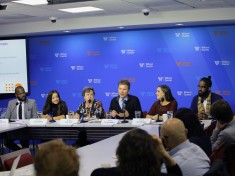-
Cultivating Meaningful Youth Engagement in Sexual and Reproductive Health Programming
November 9, 2018 By Isabel Griffith “We need to mainstream young people into the decision-making process,” said Senator Nikoli Edwards, age 25, of Trinidad and Tobago at a recent Wilson Center event on engaging youth to protect their sexual and reproductive health and rights. “Where it’s not a matter of, ‘let’s bring a young person into the room as an afterthought,’ but it should be written that a young person has to be a part of the discussion or has to be contributing in a significant way.”
“We need to mainstream young people into the decision-making process,” said Senator Nikoli Edwards, age 25, of Trinidad and Tobago at a recent Wilson Center event on engaging youth to protect their sexual and reproductive health and rights. “Where it’s not a matter of, ‘let’s bring a young person into the room as an afterthought,’ but it should be written that a young person has to be a part of the discussion or has to be contributing in a significant way.”“We need to mainstream young people into the decision-making process,” said Senator Nikoli Edwards, age 25, of Trinidad and Tobago at a recent Wilson Center event on engaging youth to protect their sexual and reproductive health and rights. “Where it’s not a matter of, ‘let’s bring a young person into the room as an afterthought,’ but it should be written that a young person has to be a part of the discussion or has to be contributing in a significant way.”
As a young person, “your expectations have been heightened, you have been encouraged to do all of this great work, but where are the institutions, where are the support mechanisms, where are the opportunities?” asked Edwards. The panelists unanimously agreed that high expectations for young people to serve and agitate for change have not been met with endless opportunities to engage.
Although many organizations have celebrated young peoples’ input, they still need to be more intentional about how they engage youth, said Cate Lane, Senior Technical Adviser at Pathfinder. Oftentimes, “we engage young people, we solicit their input, we ask them to tell us what they need and what they want,” she said. “We rev them up. They’re excited, and then we’re like, ‘thanks so much for your input,’ now we’re going to go implement our project.”
“When we are talking about youth participation, we should think about the diversity of young people,” said Dr. Ilya Zhukov, Global Focal Point for Comprehensive Sexuality Education at the United Nations Population Fund (UNFPA). Bringing key populations of young people, including LGBTQ+, HIV positive, and disabled youth, to name a few, together with decision-makers can ensure that health programming is informed by those it is meant to serve.
“When your opinion and your thoughts are influencing real documents that will then influence your education—that is a real thing,” said Lada Nuzhna, Youth Representative at Teenergizer!. Exchanges between young people and organizations working to promote adolescent health and rights should be a two-way street. “We need to see this not as a one-way street of us soliciting information from them, but as an opportunity for them to develop skills, networks, to gain access to things that they wouldn’t normally gain access to,” said Lane.
Adolescence is a dynamic period in life that can pose challenges to the longevity of youth project engagement. “If we engage young people, we can’t expect that they are going to be with us for the next five years because they are in school, they’re working, getting married,” said Lane. However, mechanisms such as youth advisory boards and councils could enable organizations to consult periodically with young people to ensure programs are responsive to their needs.
Experts agreed that a system to bring youth into the conversation on a regular basis is necessary to cultivate meaningful youth engagement, in addition to allocating resources—financial and human—to ensure that adolescent sexual and reproductive health programming is effective and responsive. “We should bring young people to the table and involve them not only in discussion but in the development and implementation of programs,” said Zhukov.
Governments, leaders of organizations and policymakers should continue to think about how to meaningfully engage with young people as partners. “I think it’s something we have to tackle,” said Lane. “There has to be this sense of partnership, where we meet each other in the middle.”
This audio was recorded at an event at the Wilson Center on October 23, 2018.
Friday Podcasts are also available for download on iTunes and Google Podcasts.
 A Publication of the Stimson Center.
A Publication of the Stimson Center.

 “We need to mainstream young people into the decision-making process,” said Senator Nikoli Edwards, age 25, of Trinidad and Tobago at a
“We need to mainstream young people into the decision-making process,” said Senator Nikoli Edwards, age 25, of Trinidad and Tobago at a 

